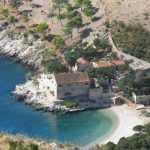As Gordana Grgas/Novac writes on the 28th of April, 2020, Croatian tourism has been dealt a severe blow owing to the ongoing coronavirus pandemic, and various experts currently estimate that tourism turnover in Croatia will fall by 60 to 70 percent when compared to last year, with revenues dropping by a massive 70-80 percent.
Employment losses of 30-50 percent will occur in Croatian tourism-related sectors (although this will be greatly affected and influenced by state measures and grants). The business operations of collective types of accommodation facilities, primarily hotels, will be jeopardised until a vaccine for the COVID-19 virus is found, and the reason is the high concentration of guests typically staying in these facilities.
This is all part of an analysis conducted in the second half of April by the investment banking department of InteCapital and HD Consulting entitled “The Croatian Tourism Sector – Can it Cope with the Coronavirus?”, showing the status and potential impact of COVID-19 on Croatian tourism and its many related sectors.
They stated that the highly reputable consulting firm, Tourism Economics, predicted that a six-month restriction period (from February to July) would result in a 28 percent drop in overall European travel (in addition to other economic effects), while an eight-month restriction period (from February to September) would result in a 48 percent decline. The worst case scenario is that the anti-epidemic restrictions will only be lifted by the end of this year, which could result in an enormous 81 percent drop in travel in Europe.
In previous crises, according to this analysis, what is known as ”V-shaped tourism” has proven to be one of the most resilient sectors with a relatively rapid return to pre-crisis levels.
“The COVID-19 crisis brings an additional level of uncertainty with it in the context of the global level of travel due to a potential change in the behaviour and preferences of the average traveller or tourist,” they note. However, they believe that Croatia has one good opportunity here: it can take advantage of being a dominant auto destination. Until the invention of the coronavirus vaccine, tourists will be motivated to keep all the elements of their travel plans under control, so it’s to be expected that destinations that can be reached easily by car from other countries will recover more quickly from the COVID-19 crisis than others.
Croatia should also take advantage of the fact that it boasts the most stringent anti-coronavirus measures in Europe (research by Oxford University) for future marketing purposes in regard to Croatian tourism and luring guests. Of course, immediately after the crisis, the focus should also be on the domestic market, where the possibility of issuing vouchers to residents should be properly explored.
The top ten Croatian tourism companies had about one billion euros in business income last year, holding about 18 percent of total accommodation capacities in Croatia and boasting as many as 18 thousand employees, with pre-tax profit, interest and taxes of about 380 million euros and investments totalling 318 million euros.
The list includes the following Croatian companies: Valamar Riviera, Luksic Group (Blue Laguna and Adriatic Luxury Hotels), Maistra (including HUP-Zagreb), Arena Hospitality Group, Liburnia Riviera, Blue Sun, Solaris, Jadranka Group, Falkensteiner and Turisthotel.
They have taken a number of different operational and strategic measures to minimise the coronavirus-induced crisis, including shifting their investment focus to investments in health and hygiene aspects and IT (digitalisation resulting in reduced contact, personalisation targeting younger guests, and monitoring guest health and safety) as well as repositioning camps, as they believe this segment of Croatian tourism will recover the fastest.
What should hoteliers operating within the Croatian tourism sector primarily focus on after the COVID-19 crisis?
The focus should be on improving personal protection and hygiene measures in hotels, more stringent operating procedures to increase productivity – process automation, monitoring new segments and targeted advertising – especially for the younger population, monitoring changes in guest behaviour and habits, and applying new marketing approaches, investments and the repositioning of self-contained accommodation units, such as apartments, villas, tents, mobile homes and campsites, and additional IT investments (digitisation, and big data for the purpose of better customer segmentation).
Given that investment bankers were involved in the analysis, it is understandable to note in the end that, unless the Croatian tourism sector recovers and returns to its ”historic” levels, there will be “a potential need for recapitalisations from 2021 onwards.”
Otherwise, during the 2009 global financial crisis, Croatian tourism was reportedly not significantly affected – overnight stays and arrivals in Croatia fell by 1.4 percent and 2.9 percent, respectively. In the case of COVID-19, and due to travel bans and restrictions until we find a vaccine, the collapse in overnight stays and arrivals could be significant and lasting, thus affecting business and financial results well into 2021 as well.
Make sure to follow our dedicated section for all you need to know about coronavirus in relation to Croatia. For more on topics like these, follow our business and travel sections.









